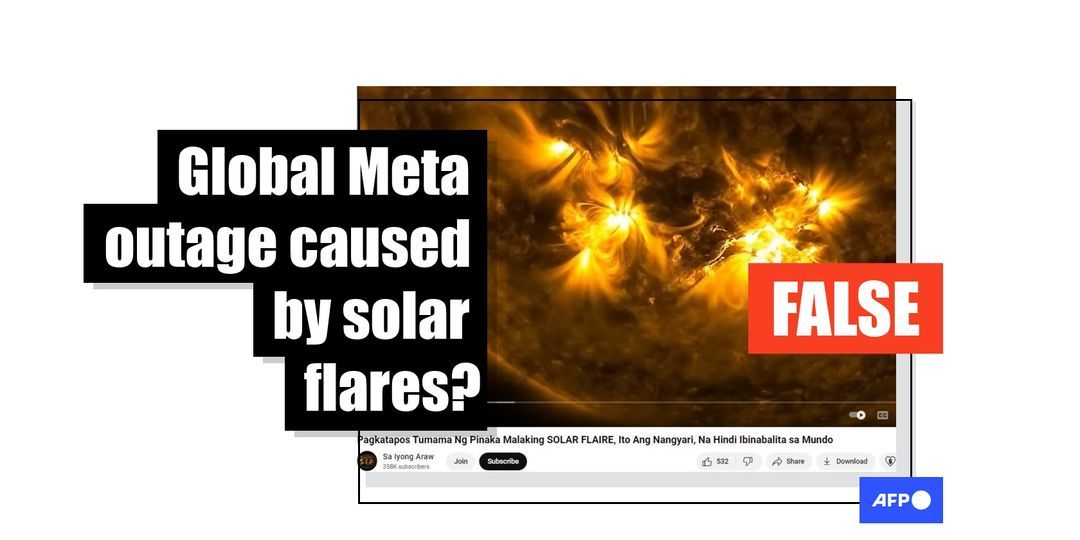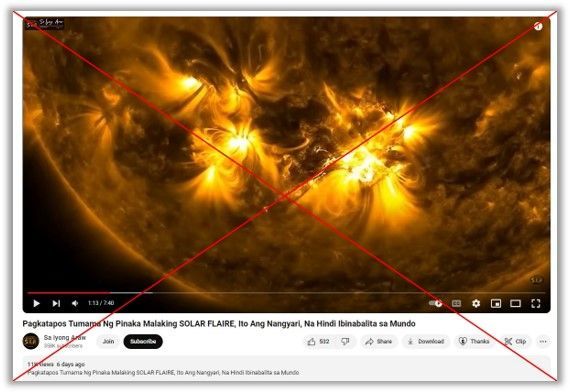
Experts told AFP there was “no connection” between three major solar flares recorded in late February 2024 and a widespread outage of Meta’s social media platforms in early March after online posts shared the false claim. They said there was no internet disruption following the solar flares.
“It is still a wonder what really happened to Facebook, Instagram and the entire Meta company. But based on my analysis, this is an effect of a solar flare,” says a March 7 YouTube video with more than 11,000 views.
Solar flares are large bursts of light energy, which mostly result in radio blackouts that affect radio frequency technologies such as ham radio operators and emergency responders (archived link).
Scientists rank the flares’ increasing intensity on a scale from A to X, with the latter ranked the strongest.
The false claim was also shared on Facebook here and here.
It circulated days after Meta suffered a highly unusual outage of all its social media platforms on March 5, which left hundreds of thousands of users locked out of their accounts.

The posts appeared to reference the three X-class solar flares that were recorded between February 21 and 22, 2024 but did not give further explanation to back up their claim.
Strong solar flares could sometimes produce coronal mass ejections (CMEs), or unusual releases of large solar materials to space. If powerful enough, CMEs can create powerful geomagnetic storms, which in turn affect satellite-to-ground communications and navigation.
Flares can reach the Earth after eight minutes, but CMEs take three to five days before their impact is felt on Earth.
Multiple experts told AFP that the solar event did not cause the recent global Meta outage.
“There is no geomagnetic storm or solar flare/radio blackout recorded on March 5, 2024. So the Meta outage is not caused by any space weather event,” Ernest Macalalad, a physics professor at the Manila-based Mapúa University told AFP on March 14.
Mario Raymundo, chief of the astronomical observation unit of Philippine weather agency PAGASA, said only users of high-frequency radio signals may experience “temporary degradation or complete loss of signal” on much of the sunlit side of the Earth as a result of X-class solar flares.
“There is no connection between the February 21-22, 2024 solar flares and the Meta widespread outage that occurred on March 5, 2024,” he said.
While scientists agree there is a theoretical risk to the solar flare’s impact, it would have to be powerful enough to produce widespread damage — akin to the 1859 Carrington event or the largest solar storm ever recorded (archived link).
Arcy Sace, an astrophysicist at the Philippine Space Agency, said internet and telecommunications were active “before, during, and after the flares on February 21-22, 2024 that supposedly caused Meta’s outage”.
“Meta’s headquarters is in California, the place where other notable tech and social media corporations such as Google, YouTube, X (formerly Twitter) are located as well, not to mention the other ones in Silicon Valley. It is therefore irresponsible to claim outright that a specific multi-million dollar tech company has been compromised by a solar flare while other companies in the vicinity aren’t affected as well,” he told AFP on March 13.
Meta spokesman Andy Stone also said on X that the global outage was caused by a “technical issue” (archived link).
AFP has previously fact-checked a similar claim about a solar event here.
